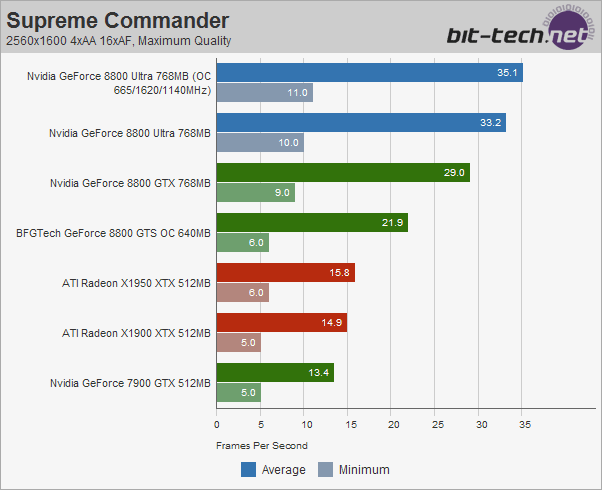Overclocking:
We overclocked Nvidia’s GeForce 8800 Ultra using RivaTuner version 2.01, as we had a number of issues running Nvidia’s own nTune software with the new card – there were no overclocking options exposed to us in the control panel. After some trials and tribulations, we managed to get Nvidia’s new flagship card stable at 665MHz core and 1140MHz on the memory. Also, according to RivaTuner, the shader clock was running up somewhere close to 1620MHz – pretty impressive!With GeForce 8800 GTX, we had no end of problems trying to get cards that used the stock cooling solution running at core clocks above 630MHz. Indeed, only BFGTech’s GeForce 8800 GTX Watercooled Edition managed to break through that barrier, topping out at 687MHz core. The tweaked manufacturing process appears to have helped here, as we’re sure there is even more left in this particular GeForce 8800 Ultra – we just ran out of time to try getting it stable at speeds any higher!
We ran it through our Supreme Commander test at 2560x1600 4xAA 16xAF, to give you an idea of how well the card performs with the increased clocks:

Final Thoughts...
Nvidia’s GeForce 8800 Ultra continues where the GeForce 8800 GTX left off, extending the company’s performance lead at the top of the discrete graphics market. However, one thing it hasn’t done is to lower the price of Nvidia’s previous flagship GeForce 8800 GTX, which currently retails for anywhere from £360 (inc VAT) a standard clocked version, while pre-overclocked versions of the card start at £365 (inc VAT).Given that the standard-clocked GeForce 8800 Ultras are expected to cost around £500 (inc VAT), Nvidia’s new flagship part is firmly placed in the exclusive “money is no object” product category. Performance is undoubtedly class leading, but you’re going to have to sell both lungs and your right leg if you want to get hold of one – I don’t even want to contemplate what you’re going to have to sell to get a pair of them.
If there’s one thing we can take from looking at Nvidia’s latest flagship product, it doesn’t appear to be too worried about ATI’s rumoured memory bandwidth advantage, as a result of implementing a 512-bit memory bus on its upcoming R600 graphics processing unit. Nvidia has managed to break through the 100GB per second barrier with its speed-bumped Ultra, which appears to be more than enough bandwidth in all of the scenarios we’ve tested here.
Of course, with the higher levels of coverage sampling anti-aliasing supported by Nvidia’s G80 GPU, you’re likely to see bigger improvements in performance. This is something that we’ll be looking at in more detail over the next couple of weeks.
The new cooling design is inspired and appears to work well – we didn’t encounter any scenarios where the fan spun up to make a racket. Instead, the card just hums along like we’ve come to expect from high-end graphics cards from both IHVs these days – this was even the case when we were testing the card at frequencies well above the stock speeds.
There’s nothing more to really say about GeForce 8800 Ultra without repeating ourselves. It’s definitely not a graphics card for everyone, but if you’re looking for the fastest graphics card on the planet and have a monitor that can show the benefits of its power, you don’t need to look much further than Nvidia’s GeForce 8800 Ultra.
However, the question is whether a factory overclocked GeForce 8800 GTX can out-gun Nvidia’s new flagship part at a fraction of the price. Thankfully, there’s plenty of time for us to answer that question before retail cards show up on the market on May 15th.




Update 2nd May 2007 9pm GMT:
Having now seen both BFGTech and XFX list this card for £528 (inc VAT), it seems like the initial pricing we were given is well off where it actually is. That changes our opinion a bit, as it is a full £110 more than EVGA's e-GeForce 8800 GTX KO ACS3, which sells for around £420 (inc VAT). We've updated our scores to reflect the different pricing information.Frankly, the EVGA shouldn't be too far behind the stock-clocked GeForce 8800 Ultra in terms of performance, so save yourself a hundred quid and upgrade your processor. We'll be running numbers on the EVGA card (as we've still got one in our offices) for comparison purposes before the availability date.

MSI MPG Velox 100R Chassis Review
October 14 2021 | 15:04









Want to comment? Please log in.